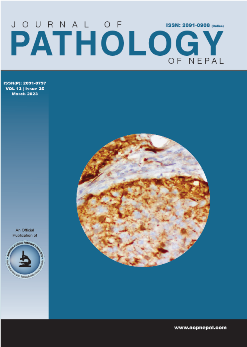The emerging role of pathologists in the era of modern medicine.
Keywords:
not applicableAbstract
In the era of modern medicine, the role of pathologists has become increasingly important and multidimensional. Most pathologists traditionally shielded comfortably behind their microscopes usually in their basement offices with minimum interactions with other clinicians or patients. The pathologists were mainly involved in the morphological diagnosis which included macroscopic and microscopic examination of received specimens. This slowly changed with pathologists starting fine needle aspirations and core biopsies. Interactions with clinicians improved with multidisciplinary meetings. The first significant change in the role of a pathologist was seen with the advent of immunohistochemistry. The understanding of protein expression on normal and pathologic cells made it possible for nosological classification of neoplasms.1 So with the use of histochemistry pathologists were able to accurately classify neoplasms.
Recently, as modern medicine changed due to recent discoveries in cellular and molecular pathways the need to individualize oncological therapies arose. Hence, the need to analyze tumor markers that are able to predict the response of the patients to targeted therapies was seen. So while previously, diagnostic pathology was aimed to define prognostic biomarkers, in the current context the pathologists are required to identify biomarkers used to predict patient’s potential response to target drugs.2 A pathologist, being a medical professional, can integrate morphological and molecular data to achieve a complete diagnosis. This significantly changed the role of a pathologist beyond morphological diagnostics to a role that’s vital for accurate disease identification, prognosis determination, and treatment planning.
Hence, the pathologist now can be described a clinician whose responsibility is to interpret and integrate morphological as well as molecular information to provide answers to diagnostic, prognostic and predictive behavior of tumors in the “ epoch of next-generation sequencing”.
It would be prudent for the currently practicing and future pathologists to incorporate the molecular knowledge into their diagnostic relam and provide continual education and training programs.
Downloads
Downloads
Published
How to Cite
Issue
Section
License
Copyright (c) 2023 Shovana Karki

This work is licensed under a Creative Commons Attribution 4.0 International License.
This license enables reusers to distribute, remix, adapt, and build upon the material in any medium or format, so long as attribution is given to the creator. The license allows for commercial use.




